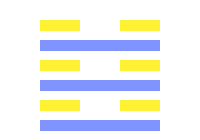38.1.2.3.4.5.6 (38 > 39)

38.1.2.3.4.5.6 (38 > 39) - THE KHWEI HEXAGRAM.
- 1. The first line, undivided, shows that (to its subject) occasion for repentance will disappear. He has lost his horses, but let him not seek for them ;--they will return of themselves. Should he meet with bad men, he will not err (in communicating with them).
- 2. The second line, undivided, shows its subject happening to meet with his lord in a bye-passage. There will be no error.
- 3. In the third line, divided, we see one whose carriage is dragged back, while the oxen in it are pushed back, and he is himself subjected to the shaving of his head and the cutting dff of his nose. There is no good beginning, but there will be a good end.
- 4. The fourth line, undivided, shows its subject solitary amidst the (prevailing) disunion. (But) he meets with the good man (represented by the first line), and they blend their sincere desires together. The position is one of peril, but there will be no mistake.
- 5. The fifth line, divided, shows that (to its subject) occasion for repentance will disappear. With his relative (and minister he unites closely and readily) as if he were biting through a piece of skin. When he goes forward (with this help), what error can there be ?
- 6. The topmost line, undivided, shows its subject solitary amidst the (prevailing) disunion. (In the subject of the third line, he seems to) see a pig bearing on its back a load of mud, (or fancies) there is a carriage full of ghosts. He first bends his bow against him, and afterwards unbends it, (for he discovers) that he is not an assailant to injure, but a near relative. Going forward, he shall meet with (genial) rain, and there will be good fortune.
38.1.2.3.4.5.6 (38 > 39) - Resuming dialogue
Both talk again despite the difficulties to get along.
Bing DeepL Google Yandex38.1.2.3.4.5.6 (38 > 39) - Resuming conversation
Both talk again despite the difficulties to get along.
Bing DeepL Google Yandex38.1.2.3.4.5.6 (38 > 39) - Kwei, l’opposition
Kwèi : 1. Différent, opposé, éloigné, étrange ; 2. Regarder fixement.
-
1. Quand (il n’y a pas d’opposition, mais concorde, que) toute cause funeste disparaît (on revient à l’union comme) un cheval perdu qui revient de lui-même sans qu’on le cherche.
Si l’on rencontre un méchant même, il n’en surviendra rien de fâcheux (on saura se préserver de ses coups ou éviter son contact corrupteur). -
2. Si l’on s’accorde en route avec son chef, tout réussira. On ne se trompe pas de chemin. — Ou : Si l’on rencontre son chef c’est qu’on ne s’est pas trompé de chemin.
Si l’on a un différend et qu’on se cherche et s’accorde, on se rencontrera sans effet funeste. - 3. (Effets de la discorde, des luttes.) On voit un char entraîné par la force, son boeuf saisi et arraché, son conducteur maltraité et le nez coupé. Mais un commencement fâcheux peut avoir une bonne fin, si l’union se rétablit.
- 4. Seul au milieu de la désunion, si le banni rencontre ensuite un honnête homme, il pourra avoir des rapports pleins de droiture et les difficultés antérieures n’engendreront plus d’inconvénient (pour ces deux hommes).
-
5. Par l’union toute cause de souci disparaît, les parents sont unis.
Litt. : se mordent la peau. Ce qui indique pénétration, union de sentiments.
Où qu’on aille, plus de cause de regret.
On est approuvé de tous.
Le grand est sincère envers le petit. Tchéou-Yih, etc. Sens : Quand la désunion a disparu, les familles sont dans la joie, mangent abondamment. - 6. Seul dans la désunion, le banni est comme quelqu’un qui voit un porc immonde ou un char plein de mauvais esprits. Il tend d’abord son arc pour tirer, puis le lâche. Si ce n’est point un méchant, un brigand ravisseur et que le sort lui soit favorable, le bonheur reviendra.
38.1.2.3.4.5.6 (38 > 39) - Renouer le dialogue
On se reparle malgré les difficultés à s'entendre.
Bing DeepL Google Yandex38.1.2.3.4.5.6 (38 > 39) - Félreértés
- 1. A barátok akik elmentek visszatérnek, a becsmérlő emberek pedig elcsendesednek ha valaki megőrzi béketűrését.
- 2. Találkozás egy távoli ismerőssel.
- 3. Meg kell feleljen az igényeknek mielőtt elfogadnák.
- 4. Segítséget kér a szomszédságból való távozáshoz hogy a nehézségeken úrrá legyen.
- 5. A másik fél véget vet az elkülönülésnek, így lehet csatlakozni hozzá.
- 6. El akarja zavarni a másikat aztán meggondolja magát a másik barátságos kérdései hallatán.
The trigrams
The trigrams are combinations of three yin and yang lines. The three bottom lines of the hexagram form the lower trigram and represent the inner situation. The three top lines form the upper trigram and represent the outer situation.
Upper trigram: The fire The water


Lower trigram: The lake The mountain


The formation: 38
What is already there

38 - THE KHWEI HEXAGRAM.
Khwei indicates that, (notwithstanding the condition of things which it denotes), in small matters there will (still) be good success.
Bing DeepL Google Yandex38 - Misunderstanding
One must revisit a misunderstanding if one wants to dispel it. If needed, one can seek advice. One may abandon the small differences.
Bing DeepL Google Yandex38 - Misunderstanding
One must revisit a misunderstanding if one wants to dispel it. If needed, one can seek advice. One may abandon the small differences.
Bing DeepL Google Yandex38 - Kwei, l’opposition
Kwèi : 1. Différent, opposé, éloigné, étrange ; 2. Regarder fixement.
Texte
Kwèi, temps mauvais où les petites affaires seules réussissent et les grandes point.
Symbolisme
Feu au-dessus, eau en dessous ; désunion. Ainsi le sage cherche l’union et la distinction (juste et convenable de ce qui doit être distingué).
Commentaire
Le feu, se mouvant au-dessus et l’eau en dessous, forment l’opposition ; de même deux soeurs vivant ensemble, mais ne s’entendant pas. L’attachement joyeux et intelligent fait que le faible et bon avance, s’élève et atteint le milieu, s’accordant ainsi avec le fort. Ainsi les petites affaires réussissent. Le ciel et la terre, bien que séparés, sont unis dans leur action. L’époux et l’épouse le sont également et doivent n’avoir qu’une seule volonté. Tous ces êtres sont distincts et leurs opérations identiques. Le principe, l’opportunité de la distinction sont choses bien graves.
38 - Le malentendu
On doit revenir sur un malentendu si on veut le dissiper. Au besoin, on peut demander conseil. On peut abandonner les petits différends.
Bing DeepL Google Yandex38 - Félreértés
Meg kell vizsgálni a félreértést ha el akarják oszlatni azt. Adott esetben lehet tanácsot kérni. A kis különbségeket fel lehet adni.
Bing DeepL Google Yandex
38.1 (38 > 64) - THE KHWEI HEXAGRAM.
The first line, undivided, shows that (to its subject) occasion for repentance will disappear. He has lost his horses, but let him not seek for them ;--they will return of themselves. Should he meet with bad men, he will not err (in communicating with them).
Bing DeepL Google Yandex38.1 (38 > 64) - Showing patience
Friends who have left will come back and derogatory people will calm down if one stays quiet.
Bing DeepL Google Yandex38.1 (38 > 64) - Showing patience
Friends who have left will come back and derogatory people will calm down if one stays quiet.
Bing DeepL Google Yandex38.1 (38 > 64) - Kwei, l’opposition
Kwèi : 1. Différent, opposé, éloigné, étrange ; 2. Regarder fixement.
Quand (il n’y a pas d’opposition, mais concorde, que) toute cause funeste disparaît (on revient à l’union comme) un cheval perdu qui revient de lui-même sans qu’on le cherche.
Si l’on rencontre un méchant même, il n’en surviendra rien de fâcheux (on saura se préserver de ses coups ou éviter son contact corrupteur).
38.1 (38 > 64) - Montrer sa patience
Les amis qui sont partis reviendront et les personnes désobligeantes se calmeront si on reste tranquille.
Bing DeepL Google Yandex38.1 (38 > 64) - Félreértés
A barátok akik elmentek visszatérnek, a becsmérlő emberek pedig elcsendesednek ha valaki megőrzi béketűrését.
Bing DeepL Google Yandex
38.2 (38 > 21) - THE KHWEI HEXAGRAM.
The second line, undivided, shows its subject happening to meet with his lord in a bye-passage. There will be no error.
Bing DeepL Google Yandex38.2 (38 > 21) - Recovering faith
One meets an acquaintance who had moved away.
Bing DeepL Google Yandex38.2 (38 > 21) - Recovering faith
One meets an acquaintance who had moved away.
Bing DeepL Google Yandex38.2 (38 > 21) - Kwei, l’opposition
Kwèi : 1. Différent, opposé, éloigné, étrange ; 2. Regarder fixement.
Si l’on s’accorde en route avec son chef, tout réussira. On ne se trompe pas de chemin. — Ou : Si l’on rencontre son chef c’est qu’on ne s’est pas trompé de chemin.
Si l’on a un différend et qu’on se cherche et s’accorde, on se rencontrera sans effet funeste.
38.2 (38 > 21) - Retrouver la foi
On rencontre une connaissance qui s'était éloignée.
Bing DeepL Google Yandex
38.3 (38 > 14) - THE KHWEI HEXAGRAM.
In the third line, divided, we see one whose carriage is dragged back, while the oxen in it are pushed back, and he is himself subjected to the shaving of his head and the cutting dff of his nose. There is no good beginning, but there will be a good end.
Bing DeepL Google Yandex38.3 (38 > 14) - Complying with requirements
One has to satisfy the requests before being accepted.
Bing DeepL Google Yandex38.3 (38 > 14) - Complying with requirements
One has to satisfy the requests before being accepted.
Bing DeepL Google Yandex38.3 (38 > 14) - Kwei, l’opposition
Kwèi : 1. Différent, opposé, éloigné, étrange ; 2. Regarder fixement.
(Effets de la discorde, des luttes.) On voit un char entraîné par la force, son boeuf saisi et arraché, son conducteur maltraité et le nez coupé. Mais un commencement fâcheux peut avoir une bonne fin, si l’union se rétablit.
Bing DeepL Google Yandex38.3 (38 > 14) - Se plier aux exigences
On doit satisfaire les demandes avant d'être accepté.
Bing DeepL Google Yandex38.3 (38 > 14) - Félreértés
Meg kell feleljen az igényeknek mielőtt elfogadnák.
Bing DeepL Google Yandex
38.4 (38 > 41) - THE KHWEI HEXAGRAM.
The fourth line, undivided, shows its subject solitary amidst the (prevailing) disunion. (But) he meets with the good man (represented by the first line), and they blend their sincere desires together. The position is one of peril, but there will be no mistake.
Bing DeepL Google Yandex38.4 (38 > 41) - Wanting to change of scenery
One asks for help to leave one's entourage in order to overcome the difficulties.
Bing DeepL Google Yandex38.4 (38 > 41) - Wanting to change of scenery
One asks for help to leave one's entourage in order to overcome the difficulties.
Bing DeepL Google Yandex38.4 (38 > 41) - Kwei, l’opposition
Kwèi : 1. Différent, opposé, éloigné, étrange ; 2. Regarder fixement.
Seul au milieu de la désunion, si le banni rencontre ensuite un honnête homme, il pourra avoir des rapports pleins de droiture et les difficultés antérieures n’engendreront plus d’inconvénient (pour ces deux hommes).
Bing DeepL Google Yandex38.4 (38 > 41) - Vouloir changer d'air
On demande de l'aide pour quitter son entourage afin de surmonter les difficultés.
Bing DeepL Google Yandex38.4 (38 > 41) - Félreértés
Segítséget kér a szomszédságból való távozáshoz hogy a nehézségeken úrrá legyen.
Bing DeepL Google Yandex
38.5 (38 > 10) - THE KHWEI HEXAGRAM.
The fifth line, divided, shows that (to its subject) occasion for repentance will disappear. With his relative (and minister he unites closely and readily) as if he were biting through a piece of skin. When he goes forward (with this help), what error can there be ?
Bing DeepL Google Yandex38.5 (38 > 10) - Giving another chance
The other ends the separation so one can join them.
Bing DeepL Google Yandex38.5 (38 > 10) - Giving another chance
The other ends the separation so one can join them.
Bing DeepL Google Yandex38.5 (38 > 10) - Kwei, l’opposition
Kwèi : 1. Différent, opposé, éloigné, étrange ; 2. Regarder fixement.
Par l’union toute cause de souci disparaît, les parents sont unis.
Litt. : se mordent la peau. Ce qui indique pénétration, union de sentiments.
Où qu’on aille, plus de cause de regret.
On est approuvé de tous.
Le grand est sincère envers le petit. Tchéou-Yih, etc. Sens : Quand la désunion a disparu, les familles sont dans la joie, mangent abondamment.
38.5 (38 > 10) - Donner une autre chance
L'autre met fin à la séparation, alors on peut le rejoindre.
Bing DeepL Google Yandex38.5 (38 > 10) - Félreértés
A másik fél véget vet az elkülönülésnek, így lehet csatlakozni hozzá.
Bing DeepL Google Yandex
38.6 (38 > 54) - THE KHWEI HEXAGRAM.
The topmost line, undivided, shows its subject solitary amidst the (prevailing) disunion. (In the subject of the third line, he seems to) see a pig bearing on its back a load of mud, (or fancies) there is a carriage full of ghosts. He first bends his bow against him, and afterwards unbends it, (for he discovers) that he is not an assailant to injure, but a near relative. Going forward, he shall meet with (genial) rain, and there will be good fortune.
Bing DeepL Google Yandex38.6 (38 > 54) - Changing one's mind
One wanted to keep the other one away, and then holds back because the latter comes to ask friendly questions.
Bing DeepL Google Yandex38.6 (38 > 54) - Changing one's mind
One wanted to keep the other one away, and then holds back because the latter comes to ask friendly questions.
Bing DeepL Google Yandex38.6 (38 > 54) - Kwei, l’opposition
Kwèi : 1. Différent, opposé, éloigné, étrange ; 2. Regarder fixement.
Seul dans la désunion, le banni est comme quelqu’un qui voit un porc immonde ou un char plein de mauvais esprits. Il tend d’abord son arc pour tirer, puis le lâche. Si ce n’est point un méchant, un brigand ravisseur et que le sort lui soit favorable, le bonheur reviendra.
Bing DeepL Google Yandex38.6 (38 > 54) - Changer d'avis
On avait voulu éloigner l'autre, et puis on se retient car celui-ci vient pour poser des questions amicales.
Bing DeepL Google Yandex38.6 (38 > 54) - Félreértés
El akarja zavarni a másikat aztán meggondolja magát a másik barátságos kérdései hallatán.
Bing DeepL Google YandexIn the making: 39
What is poised to happen

39 - THE KIEN HEXAGRAM.
In (the state indicated by) Kien advantage will be found in the south-west, and the contrary in the north-east. It will be advantageous (also) to meet with the great man (In these circumstances), with firmness and correctness, there will be good fortune.
Bing DeepL Google Yandex39 - Uncertainty
Solving a difficulty requires a patient study. If one fails, one will receive help after showing that one has done one's best.
Bing DeepL Google Yandex39 - Uncertainty
Solving a difficulty requires a patient study. If one fails, one will receive help after showing that one has done one's best.
Bing DeepL Google Yandex39 - Kién, l’obstacle
Kién : Difficulté, danger, noble hardiesse.
Texte
Énergie dans les difficultés ; peut réussir d’un côté et pas de l’autre. Par son succès se montre le grand homme. Sa perfection est heureuse et peut sauver des périls.
Symbolisme
L’eau sur une montagne. Par la vertu de l’énergie, l’homme sage se corrige et perfectionne sa vertu.
Commentaire
Kién est difficulté, danger se présentant en face ; si, voyant le danger, on sait rester ferme, quelle grande sagesse ! Le succès ou l’insuccès vient de ce que l’on garde la voie droite ou que la sagesse est à bout. On reconnaît à cela l’homme vraiment grand et plein de mérites. Il faut rester ferme dans la justice et la bonté pour établir fermement un État. Oh ! que le moment des difficultés a d’importance !
39 - L'incertitude
Pour résoudre une difficulté, on doit l'étudier patiemment. Si l'on échoue, on recevra de l'aide après avoir montré que l'on a fait le maximum.
Bing DeepL Google Yandex39 - Bizonytalanság
Hogy megoldja a problémát, meg kell vizsgálnia türelmesen. Ha valaki hibázott, segítséget kap miután megmutatja hogy minden tőle telhetőt megtett.
Bing DeepL Google YandexThe nuclear hexagram: 63.1.2.3.4.5.6 (63 > 64)
The nuclear hexagram is the association of the two inner trigrams (lines 2,3,4 and 3,4,5). It represents the root, or the origin of the situation.

63.1.2.3.4.5.6 (63 > 64) - THE KÎ 3Î HEXAGRAM.
- 1. The first line, undivided, (shows its subject as a driver) who drags back his wheel, (or as a fox) which has wet his tail. There will be no error.
- 2. The second line, divided, (shows its subject as) a wife who has lost her (carriage-)screen. There is no occasion to go in pursuit of it. In seven days she will find it.
- 3. The third line, undivided, (suggests the case of) Kao 3ung who attacked the Demon region, but was three years in subduing it. Small men should not be employed (in such enterprises).
- 4. The fourth line, divided, shows its subject with rags provided against any leak (in his boat), and on his guard all day long.
- 5. The fifth line, undivided, shows its subject (as) the neighbour in the east who slaughters an ox (for his sacrifice) ; but this is not equal to the (small) spring sacrifice of the neighbour in the west, whose sincerity receives the blessing.
- 6. The topmost line, divided, shows its subject with (even) his head immersed. The position is perilous.
63.1.2.3.4.5.6 (63 > 64) - Maximum
One is trapped in one's feelings so one abandons the direction of operations to others.
Bing DeepL Google Yandex63.1.2.3.4.5.6 (63 > 64) - Maximum
One is trapped in one's feelings so one abandons the direction of operations to others.
Bing DeepL Google Yandex63.1.2.3.4.5.6 (63 > 64) - Tchi tzi, ce qui suit l’achèvement
Tchi-tzi : traversée achevée, achèvement, succès, moyen d’achever, compléter.
- 1. Traversée achevée comme celle de quelqu’un qui, ayant fini son voyage, reprend les roues de son char, ou d’un renard qui, tout en traversant une rivière, a mouillé sa queue complètement.
-
2. Voyage fini (interrompu), comme d’une femme qui, ayant perdu le voile de son char (Keū tchi pi, tenture qui entourait le char et cachait la personne qui le montait. Sans ce voile, une femme vertueuse ne pouvait voyager. Son voyage était donc fini jusqu’à ce qu’elle le retrouve et elle ne pouvait aller à découvert pour le chercher) ne peut le chercher, mais le retrouve seulement après quelques (sept) jours.
Elle agit ainsi parce qu’elle suit la voie de la sagesse. -
3. Expédition achevée. — Kao-tsong (empereur de la dynastie Shang ; régnait vers 1300 et resta cinquante-neuf ans sur le trône. Les démons dont il s’agit sont les aborigènes insoumis et déprédateurs) attaqua la région des démons et, en trois ans, acheva son triomphe. Un prince vulgaire n’eût pu le faire.
Il eut beaucoup de peine. -
4. Lorsque les bords, les franges d’un habit se mouillent, il faut être sur ses gardes jusqu’au bout de la traversée (ou bien : lorsqu’en bateau on est obligé d’employer les bords de ses habits pour boucher les trous, etc.).
Il y a lieu de craindre alors. -
5. Tel voisin de gauche (Est) sacrifie un bœuf, mais il n’atteint pas le mérite de son voisin de droite (Ouest), qui fait un sacrifice très inférieur. — C’est la droiture d’intention (et non l’oeuvre matérielle) qui fait obtenir le bonheur, condition de la réussite, d’un achèvement heureux.
Ainsi arrive grand bonheur. -
6. Celui qui, en traversant (un fleuve), se mouille la tête, est en danger. (Si la tête même entre dans l’eau.)
Cette situation est dangereuse, on ne peut en prévoir l’issue.
63.1.2.3.4.5.6 (63 > 64) - Le maximum
On est prisonnier de ses sentiments alors on abandonne aux autres la direction des opérations.
Bing DeepL Google Yandex63.1.2.3.4.5.6 (63 > 64) - Maximum
- 1. Kéri a közelállókat hogy készüljenek fel mielőtt válaszolnak.
- 2. Nem kér bizalmat de megkapja a javítások révén.
- 3. Keményen dolgozik hogy megoldjon egy problémát, ez gyötrelmes lesz. A legrátermettebbnek kell kezdenie.
- 4. Ha valaki nem várt nehézségbe ütközik, siessen ellenőrizni.
- 5. Az egyszerű sokkal sikeresebb lesz mint a bonyolult.
- 6. A többiek óvakodnak a segítségnyújtástól, így nélkülük javít tovább.
Ruler
The starting situation

38.6 (38 > 54) - THE KHWEI HEXAGRAM.
The topmost line, undivided, shows its subject solitary amidst the (prevailing) disunion. (In the subject of the third line, he seems to) see a pig bearing on its back a load of mud, (or fancies) there is a carriage full of ghosts. He first bends his bow against him, and afterwards unbends it, (for he discovers) that he is not an assailant to injure, but a near relative. Going forward, he shall meet with (genial) rain, and there will be good fortune.
Bing DeepL Google Yandex38.6 (38 > 54) - Changing one's mind
One wanted to keep the other one away, and then holds back because the latter comes to ask friendly questions.
Bing DeepL Google Yandex38.6 (38 > 54) - Changing one's mind
One wanted to keep the other one away, and then holds back because the latter comes to ask friendly questions.
Bing DeepL Google Yandex38.6 (38 > 54) - Kwei, l’opposition
Kwèi : 1. Différent, opposé, éloigné, étrange ; 2. Regarder fixement.
Seul dans la désunion, le banni est comme quelqu’un qui voit un porc immonde ou un char plein de mauvais esprits. Il tend d’abord son arc pour tirer, puis le lâche. Si ce n’est point un méchant, un brigand ravisseur et que le sort lui soit favorable, le bonheur reviendra.
Bing DeepL Google Yandex38.6 (38 > 54) - Changer d'avis
On avait voulu éloigner l'autre, et puis on se retient car celui-ci vient pour poser des questions amicales.
Bing DeepL Google Yandex38.6 (38 > 54) - Félreértés
El akarja zavarni a másikat aztán meggondolja magát a másik barátságos kérdései hallatán.
Bing DeepL Google YandexCorrection
The direction where the ruler is going to bend

38.1.2.3.4.5 (38 > 53) - THE KHWEI HEXAGRAM.
- 1. The first line, undivided, shows that (to its subject) occasion for repentance will disappear. He has lost his horses, but let him not seek for them ;--they will return of themselves. Should he meet with bad men, he will not err (in communicating with them).
- 2. The second line, undivided, shows its subject happening to meet with his lord in a bye-passage. There will be no error.
- 3. In the third line, divided, we see one whose carriage is dragged back, while the oxen in it are pushed back, and he is himself subjected to the shaving of his head and the cutting dff of his nose. There is no good beginning, but there will be a good end.
- 4. The fourth line, undivided, shows its subject solitary amidst the (prevailing) disunion. (But) he meets with the good man (represented by the first line), and they blend their sincere desires together. The position is one of peril, but there will be no mistake.
- 5. The fifth line, divided, shows that (to its subject) occasion for repentance will disappear. With his relative (and minister he unites closely and readily) as if he were biting through a piece of skin. When he goes forward (with this help), what error can there be ?
38.1.2.3.4.5 (38 > 53) - Anticipating criticism
One is going to clean up so as not to have to worry about the slanderers.
Bing DeepL Google Yandex38.1.2.3.4.5 (38 > 53) - Anticipating criticism
One is going to clean up so as not to have to worry about the slanderers.
Bing DeepL Google Yandex38.1.2.3.4.5 (38 > 53) - Kwei, l’opposition
Kwèi : 1. Différent, opposé, éloigné, étrange ; 2. Regarder fixement.
-
1. Quand (il n’y a pas d’opposition, mais concorde, que) toute cause funeste disparaît (on revient à l’union comme) un cheval perdu qui revient de lui-même sans qu’on le cherche.
Si l’on rencontre un méchant même, il n’en surviendra rien de fâcheux (on saura se préserver de ses coups ou éviter son contact corrupteur). -
2. Si l’on s’accorde en route avec son chef, tout réussira. On ne se trompe pas de chemin. — Ou : Si l’on rencontre son chef c’est qu’on ne s’est pas trompé de chemin.
Si l’on a un différend et qu’on se cherche et s’accorde, on se rencontrera sans effet funeste. - 3. (Effets de la discorde, des luttes.) On voit un char entraîné par la force, son boeuf saisi et arraché, son conducteur maltraité et le nez coupé. Mais un commencement fâcheux peut avoir une bonne fin, si l’union se rétablit.
- 4. Seul au milieu de la désunion, si le banni rencontre ensuite un honnête homme, il pourra avoir des rapports pleins de droiture et les difficultés antérieures n’engendreront plus d’inconvénient (pour ces deux hommes).
-
5. Par l’union toute cause de souci disparaît, les parents sont unis.
Litt. : se mordent la peau. Ce qui indique pénétration, union de sentiments.
Où qu’on aille, plus de cause de regret.
On est approuvé de tous.
Le grand est sincère envers le petit. Tchéou-Yih, etc. Sens : Quand la désunion a disparu, les familles sont dans la joie, mangent abondamment.
38.1.2.3.4.5 (38 > 53) - Anticiper les critiques
On va faire le ménage pour ne pas avoir à se soucier des médisants.
Bing DeepL Google Yandex38.1.2.3.4.5 (38 > 53) - Félreértés
- 1. A barátok akik elmentek visszatérnek, a becsmérlő emberek pedig elcsendesednek ha valaki megőrzi béketűrését.
- 2. Találkozás egy távoli ismerőssel.
- 3. Meg kell feleljen az igényeknek mielőtt elfogadnák.
- 4. Segítséget kér a szomszédságból való távozáshoz hogy a nehézségeken úrrá legyen.
- 5. A másik fél véget vet az elkülönülésnek, így lehet csatlakozni hozzá.

